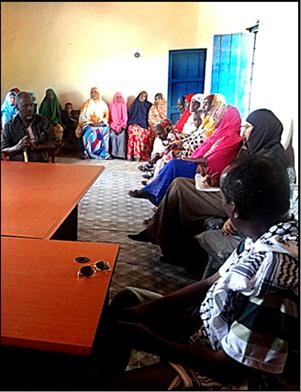
When Somaliland’s local council elections sparked protests in the winter of 2012-2013, government representatives, women and young people used the new Aynabo community hall to discuss conflict resolution.
“Somalis value dialogue. There is a famous saying: ‘To talk is to reconcile.’ This venue is providing a healthy space to resolve conflict. Issues arising from election-related tension were discussed,” said Aynabo elder Abokor Farah Ismail.
USAID’s Transition Initiatives for Stabilization project is supporting the construction and rehabilitation of over 50 buildings across Somaliland, including government offices, tax collection centers, markets and several projects in Aynabo such as the community hall.
Aynabo is in Sool, one of two regions contested by Somaliland, Puntland and the self-declared Khatumo State. Neglected due to insecurity and lack of funds, Sool has high unemployment and weak governance.
The project gathered together community and government representatives to select activities to promote peace and stability. Meeting participants chose to build the community hall, which was completed in December 2012. It is is now regularly used to resolve community feuds and ease political tension. For example, the hall was recently used to help legitimize the election of Aynabo’s new mayor and his deputy through community discussion and reconciliation, which improved government transparency and eased community election tensions.
Across Somalia, USAID is implementing over 400 quick-impact projects worth approximately $31 million, in close partnership with Somali local or federal government, civil society and community members. Communities decide what projects will be implemented, and supervise progress from bidding to implementation to final evaluations. This ensures that the program, which runs from 2010-2015, leaves a tangible, long-term contribution beyond bricks and mortar.







Comment
Make a general inquiry or suggest an improvement.